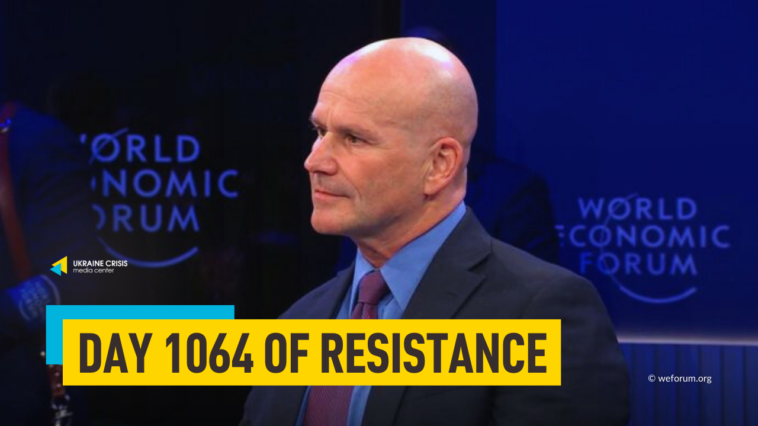Ukraine’s Defense Ministry approves the domestic Poseidon drone for deployment in the country’s military. Russia does not have a potential for a major breakthrough in Ukraine, according to a top NATO commander. The EU foreign policy chief acknowledges Trump was right in saying EU doesn’t spend enough on defense.
Ukraine’s Defense Ministry approves domestic Poseidon drone for deployment in country’s military
Ukraine’s Defense Ministry said Wednesday that it had assigned a code number to the domestically produced Poseidon unmanned aerial system and had approved the drone for deployment in the Ukrainian military.
The Poseidon can operate in temperatures ranging from -20 °C to +45 °C and can fly in strong winds, Deputy Defense Minister Dmytro Klimenkov said. The drone is equipped with an electric engine and advanced navigation technology. A full battery charge enables several hours of continuous use, he added. Its operational altitude exceeds the range of many Russian air defense systems, Klimenkov said.
The Ukrainian government had procured and deployed more than one million drones to the front lines, President Volodymyr Zelenskyi announced on October 14, 2024.
In 2024, Ukrainian drones accounted for 96.2 per cent of all unmanned aerial systems supplied to the country’s defense forces, Ukraine’s Defense Minister Rustem Umerov said on December 28.
Early this year, Ukrainian Prime Minister Denys Shmyhal announced that in 2025, the country aims to produce 30,000 long-range drones and 3,000 cruise missiles and missile-drones.
Around a third of weapons (33-34 per cent) Ukraine currently uses are domestically produced, President Zelenskyi said earlier this month. EU-supplied weapons account for more than 30 per cent, and U.S.-supplied armaments constitute 40 per cent of the country’s weaponry, he added.
Russia does not have potential for major breakthrough in Ukraine, top NATO commander says
Russia does not have a potential for a major breakthrough in Ukraine at the moment, Supreme Allied Commander Europe, General Christopher Cavoli said during a discussion on the sidelines of the World Economic Forum in Davos on Tuesday.
When asked how he sees the war evolving over the next year and whether he was worried that Ukraine could lose quite rapidly, Cavoli said: “I’m not worried that Ukraine could suddenly lose.”
“I don’t see the potential for a massive breakdown or breakthrough. That’s not a political, but a military judgement. And it’s got to do with both sides: the effective defenses that the Ukrainians have been putting in, but also the difficulty that the Russian side has in generating significant offensive forces to be able to exploit a potential breakthrough,” he explained.
There could be a lot more of the same sort of incremental advances that have already happened, he said.
“They are exhausting for Russia. There is a reason Russia brought thousands and thousands of soldiers from North Korea in to help fight,” Cavoli said.
“We’ll continue to see this tension between the desire to advance and the shortage of manpower on the Russian side,” he continued.
“I think that will define much of the conflict and will push the Russians to use a lot more stand-off weapons, as you’ve seen them increasingly do over the past years,” Cavoli argued.
Ukrainian President Volodymyr Zelenskyi earlier said that the war should be brought to an end in 2025. He emphasized a number of times that Ukraine needs solid security guarantees as part of a potential peace deal.
EU foreign policy chief acknowledges Trump was right in saying EU doesn’t spend enough on defense
U.S. President Donald Trump was right in saying that EU members don’t spend enough on defense, EU High Representative for Foreign Affairs and Security Policy Kaja Kallas said during a speech at the annual conference of the European Defence Agency on Wednesday.
Russia could test the European Union’s readiness to defend itself in three to five years’ time, Kallas said, citing EU’s national intelligence agencies. In her speech, she highlighted the need for the bloc to spend more on defense and have strong defense industries.
“Last year, Member States collectively spent an average 1.9 per cent of GDP on defense. Russia is spending nine per cent. We spend billions on our schools, healthcare and welfare. But if we don’t invest more in defense, all of this is at risk,” Kallas said.
Europe’s failure to invest in military capabilities also sends a dangerous signal to the aggressor, she added.
“President Trump is right to say we don’t spend enough. It is time to invest. We need investment from member states and the private sector, but also from the common European Union budget,” Kallas said.
Trump said earlier this month NATO members should spend five per cent of gross domestic product on defense.
Speaking at the World Economic Forum in Davos on Tuesday, Ukrainian President Volodymyr Zelenskyi echoed Trump’s call for a five-per cent defense spending target for European allies.




